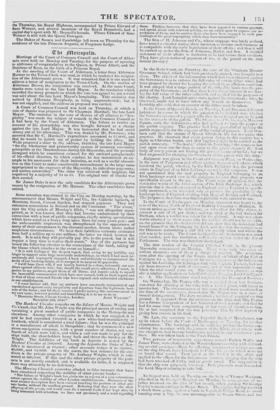In the Rolls Court, on Saturday, the ease of the
'Wimborn Minster Grammar School, which had been previously argued, was brought to a close. The object of the information which had been obtained against the Governors was to enforce the full value of certaiu tithes which had been granted by charter for keeping the school in an efficient condition. It was alleged that a large portion of the titheable lands was the pro- perty of the Governors ; and that they had a direct interest in not hay- ing the full value of the tithes collected, and applied for the purposes of the charity. Lord Langdale gave costs against the Governors; who, he observed, ought not to have taken any benefit to themselves. His Lordship also said, that an account of the tithes must he taken.
In the Court of Queen's Bench, on Tuesday, Lord Denman delivered judgment in a case in which the question to l. d■!('Ilell was, whether the funeral-exoenses of a pauper M110 di VS ID I I 11(1111:11 are to be paid by the overseers of the parish. The Overee.rso;' Ilmover Square, were the defendants; who had refweil to bury the pauper at the parish expense. The practice hail fling prevailed of malting the parish responsible for the expoise of the burial of paupers. Lord Den- man said that the statute of Queen Elizabeth did not recognize this practice. He observed that every person dying in this country has a right to Christian burial, and that implies a right to be carried to the parish cemetery. " No doubt," added hi:. Lordship, " the common law cast upon some one the duty to carry to the grave decently the dead body of every person not having the private means of burial ; but we find no ground for charging the Overseers of the sarieh with this duty."
Judgment was given in the (7ourt of Common Pleas, en Wednesday, in the case of Pergusson and others against Spencer anl others, which involved the point, whether, by the Irish Bankrupt Act, the personal estate in England of im Irish bankrupt yeeted in the assignees. It was not questioned that the real property in England belonging to an Irish bankrupt would vest in the assignees, because that property was specifically named in the act. The Court were of opinion, that the restrictive words of the Ullst section of the Irish Bankrupt Act, which provide that it should hot extend to England unless England is specifi- cally mentioned, were intended only to prevent the possibility of the bankrupt-laws of England clashing with those of Ireland and Scotland. The judgment, therefore, was that the plaintiffs were entitled to sue.
In the Court of Exchequer, on Monday, areument was heard in the ease of the Great North of England Railway Company r. Biddulph. It was an action apinst time defendant, as subscriber for fifty shares, to
recover a call of et. per ehare ; and was tried at the last Assizes for Durham, when a verdict was Liken for the plaintiff. A rttle was after- wards obtained to show caus,2 NI-h.) the verdict should not be set aside, on the grounds that the deeleration did not ehow that the defendant had bound himself to the Company by deed, and also that the resolution of the Directors authorizing a call did not specify when and where the call was to be made. The Court decided that the declaration was good after verdict, and the resolution suitilcicunly explicit snider the Act of Parliament. The rule was therefore discharged.
The first session of the Central CI-lied/ad Court in the sresent Mayoralty commenced on Monday. The:- e e only two cases of serious moment; one of them a charge - • Ier. Mr. Adolphus, '
soon after the openiug of the Court, chili of the Earl of Cardigan for a further respite of his is • :aS the indictment against his Lordship, for fighting a duel • :in Tuekett, had not yet been removeul by writ of certiorar:, ti say when the trial would come ore The , ' - • H- was e., C also a similar application on behalf of C : i rd .0..11 .zaa's
se, ••1. The reecianizences stand res1 e I ) ■ ember Seeeioas.
On Wednesday, Mr. Pearce, who was ete fo.ea last Sessions, was tried for shooting at his wife, with a leaded pistol, with intent to murder her. The circumstances of this ceee, whielt were mentioned at the time of the occurrence, showed that Mr. Pearce was in a state of mental derangement. The Jery returned a yeedie: of eciptittal on that ground. It appeared from the evidence on the trial. that Mrs. Pears has a fortune independent of her husband of a year :and that he had for some time been cotnplaining, of her want of attention to him. Ile at last imagined that she was poisoning him by slow degrees by giving him arsenic in his food.
Mr. Law, the secretary to the Imperial Bank et' Manchester, was again taken before the Court of Bankeuptcy n Tmeday. for another examination. The bankrupt said. he could not pro,Inee the books con- taining his accounts with the sartnere of the Bank, all of whonu. with one exception, had become bankrupts; tier had he any vouchers ro- duce. He was taken back to the Fleet Prisou.
Two persons of respectable appearance, named Patrick Wa and
James Trott, were charged at the Mensionhouse use •eles
several :isitranee-otilees by effecting 111,1:r:111e, • ant ou the ship Dryad. from Liverpool to Cuba. for seeds whieh e , • e not on board that veseel. 'l'rott acted as the breker in the tided-. and applied to the offices fir the full amount insured. alleging that :I. ,hip bed been wrecked off Cuba, and no goods saved. The supposiSen that the ship was purposely wrecked. Both erisoners were renlauded. the Lord Mayor refusing to take hail.


























 Previous page
Previous page